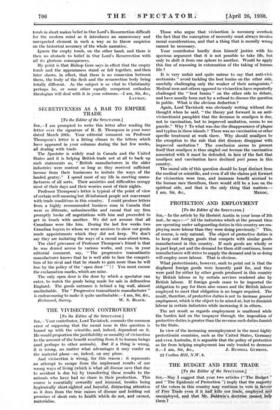THE VIVISECTION CONTROVERSY [To the Editor of the SPECTATOR:]
Stn,—Your contributor, Lord Tavistock, commits the common error of supposing that the moral issue in this question is bound up with the scientific, and, indeed, dependent on it. He would proportion the justifiability or morality of vivisection to the amount of the benefit resulting from it to human beings (and perhaps to other animals). But if a thing is wrong, it is wrong, no matter what advantages it may confer on the material plane—or, indeed, on any plane.
And vivisection is Wrong, for this reason : it represents an attempt to escape from the unpleasant results of our wrong ways of liidOg (Which" is-what all disease save that due to accident is due to) by transferring these .results to the animals who have had no share in their production. This course is essentially : cowardly and immoral, besides being hygienically shOrt-Sighted and 'harmful, distracting attention as it does from the true causes of disease and holding out promises of short cuts to health which do not, and cannot, Materialise. Those who argue that vivisection is necessary overlook the fact that the conception of necessity must always involve moral considerations, and that a thing that is morally wrong cannot be necessary.
Your contributor hardly does himself justice with his specious argument that it is not possible to take life, but only to shift it from one sphere to another. Would he apply this line of reasoning in extenuation of the taking of human life ?
It is very unfair and quite untrue to say that anti-vivi- sectionists " avoid tackling the best brains on the other side, carefully challenging only the weaker of their antagonists." Medical men and others opposed to vivisection have repeatedly challenged the " best brains" on the other side to debate, and have usually been met by a refusal to discuss the question in public. What is the obvious deduction ?
Again, Lord Tavistock was obviously writing without due thought when he said, " the theory , put forward in an anti- vivisectionist pamphlet that the decrease in smallpox is due, not to vaccination, but to improved sanitation, seems to me puerile." Why ? To what was due the disappearance of plague and typhus in these islands ? There was no vaccination or other specific treatment at work there. Why should smallpox be the exception to the rule that dirt diseases diSappear with improved sanitation ? The conclusion seems to present itself that smallpox is thui singled out &mime the vaccination associated with it must be defended, in fliCe of the faCt that smallpox and vaccination have declined parr passu in this
country. _ ,
The moral side of this question should be kept distinct from the medical Or. seientifie, and even if all the claims Pia fOrward for . vivisection were true, and immense benefit accrued "to the human race therefrom, there would still be. a loss on the spiritual side, and that is the only thing that 'matters.—




































 Previous page
Previous page